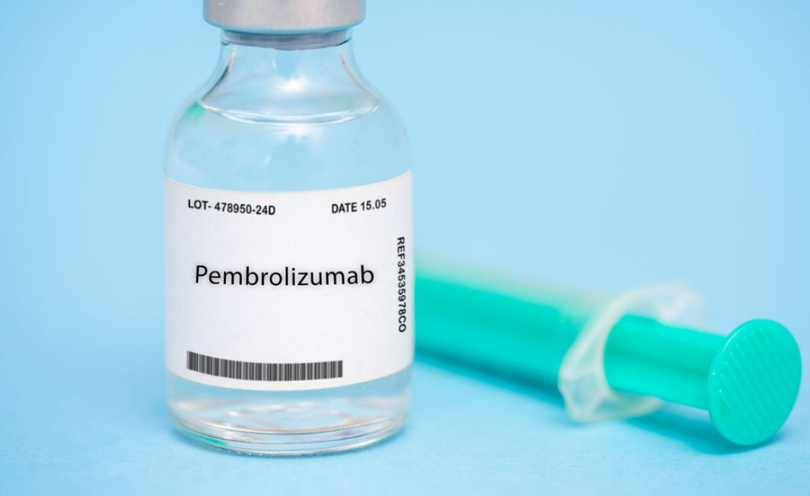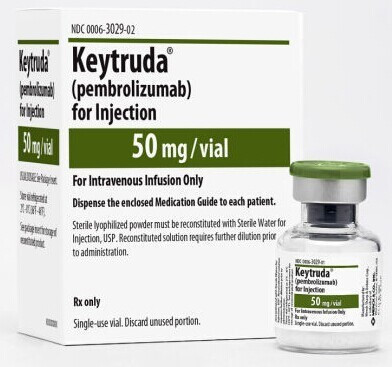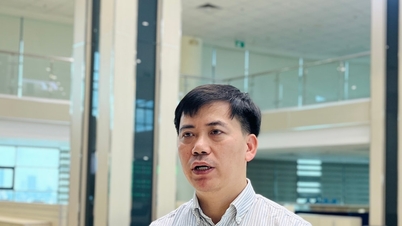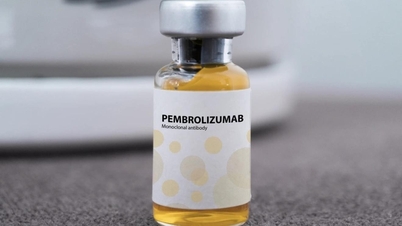The registration certificate for circulation in Vietnam for the Russian anti-cancer drug pembroria - a preparation with the main active ingredient pembrolizumab, will expand the treatment options for cancer patients in Vietnam. This active ingredient was once widely known under the brand name keytruda, used in many advanced cancer treatment regimens in the world .
1. What is pembrolizumab?
Pembrolizumab is a monoclonal antibody belonging to the immune checkpoint inhibitor group (PD-1/PD-L1 inhibitors). The drug's mechanism of action is based on blocking the PD-1 receptor (programmed death receptor-1) - a "switch" that helps cancer cells evade attacks by the immune system.
When this receptor is inhibited, immune cells (T cells) are "released" to recognize and destroy cancer cells. This approach marks a turning point in cancer treatment, because instead of directly attacking the tumor with chemicals, pembrolizumab activates the patient's own immune system to fight cancer. The drug is administered as an intravenous infusion, administered by an oncologist.

2. Not a new drug, but expanding treatment options for patients
Pembroria – a drug containing the active ingredient pembrolizumab produced in Russia – is a biosimilar to keytruda, which was previously licensed by the Drug Administration of Vietnam. The additional licensing of pembroria helps diversify the supply, reduce treatment costs and ensure patients have more options to access this advanced therapy.
Pembrolizumab is currently one of the mainstay immunotherapy drugs in the treatment regimen for many advanced or metastatic cancers, when surgery and chemotherapy are no longer effective.
3. What types of cancer does pembrolizumab treat?
Pembrolizumab is indicated for the treatment of many different types of cancer, including: Non-small cell lung cancer (NSCLC), malignant melanoma, head and neck cancer, classical Hodgkin lymphoma, renal cell cancer, bladder, liver, stomach, esophagus, cervix, triple-negative breast cancer and biliary tract cancer...
In addition, the drug is also indicated in the treatment of tumors with specific gene mutations such as MSI-H, high TMB or PD-L1 positive. In clinical practice, pembrolizumab is often used when the cancer has metastasized, or when the patient does not respond to traditional methods such as surgery, radiotherapy or chemotherapy.
For some cancers, your doctor will prescribe pembrolizumab after your tumor tests positive for PD-L1 or has specific genetic abnormalities.
4. Warnings and precautions for use
Pembrolizumab is a drug that strongly affects the immune system, so in addition to effectively killing cancer cells, the drug can also cause immune cells to mistakenly attack healthy tissue of the body.
Users may experience serious immune reactions in the lungs, liver, kidneys, intestines, thyroid, pituitary, or adrenal glands, which can be life-threatening if not detected and treated early.
Warning symptoms to watch out for include: Cough, difficulty breathing, chest pain, yellowing of the skin or eyes, severe diarrhea, high fever, persistent fatigue, muscle and joint pain, mood changes or hormonal disturbances.
Additionally, pembrolizumab is not recommended for pregnant or breastfeeding women, as the drug may cause serious harm to the fetus or newborn baby. Patients should inform their doctor if they have an autoimmune disease, have had an organ or stem cell transplant, or are taking other immunosuppressive drugs, as these factors increase the risk of side effects.

5. Common side effects
Like many other biologics, pembrolizumab can cause mild to moderate side effects, including nausea, loss of appetite, diarrhea, fatigue, hair loss, rash, itching, dry skin, and joint pain.
Some patients may experience high blood pressure, liver or kidney dysfunction, or low blood cell counts. Infusion reactions (such as fever, dizziness, itching, chest tightness) may occur but are usually controlled with supportive medications. The doctor will closely monitor the patient's condition throughout the treatment to detect early signs of abnormalities.
6. Treatment efficacy and prospects
Since its first approval by the FDA (US Food and Drug Administration) in 2014, pembrolizumab has demonstrated remarkable effectiveness in prolonging survival and improving quality of life for many patients with advanced cancer. In particular, in the group of patients with tumors expressing high PD-L1, the drug significantly increased the rate of long-term response compared to conventional chemotherapy.
Studies have also noted that some patients achieve complete remissions that last for years, which is rare with older treatment regimens.
7. The role of pembroria in Vietnam
The licensing of pembroria in Vietnam is of great significance in terms of health strategy and access to modern cancer drugs. Previously, pembrolizumab was mainly imported under the trade name keytruda, which was expensive and dependent on supply from the US or Europe.
Having a similar product from Russia increases competition, ensures stable supply and reduces costs for patients, especially when the demand for immunotherapy treatment is increasing.
8. Notes on treatment and monitoring
Pembrolizumab is not suitable for all cancer patients. The decision to use the drug should be based on the results of histological and genetic tests, as well as the patient's general condition, underlying disease, and treatment history.
During treatment, patients must strictly adhere to the schedule of drug infusion and follow-up visits. The doctor will perform periodic tests to evaluate the effectiveness of treatment and detect early immune complications.
The appearance of pembroria with the active ingredient pembrolizumab marks a new step forward in cancer treatment in Vietnam, bringing more chances of survival to many patients. However, this is a special drug, only used at specialized cancer medical facilities and needs to be closely monitored by experienced doctors.
Pembrolizumab is not only a symbol of the progress of modern medicine, but also a testament to the medical industry's relentless efforts in opening the door of hope for Vietnamese cancer patients.
(This article is for reference only and is not a substitute for medical advice, diagnosis or treatment. Patients should follow the instructions of a medical specialist).
Source: https://baohatinh.vn/thuoc-tri-ung-thu-cua-nga-duoc-cap-phep-o-viet-nam-co-phai-thuoc-moi-nen-hieu-the-nao-post299286.html





![[Photo] Highways passing through Dong Nai](https://vphoto.vietnam.vn/thumb/1200x675/vietnam/resource/IMAGE/2025/11/12/1762940149627_ndo_br_1-resize-5756-jpg.webp)

























































































![Dong Nai OCOP transition: [Article 3] Linking tourism with OCOP product consumption](https://vphoto.vietnam.vn/thumb/402x226/vietnam/resource/IMAGE/2025/11/10/1762739199309_1324-2740-7_n-162543_981.jpeg)








Comment (0)